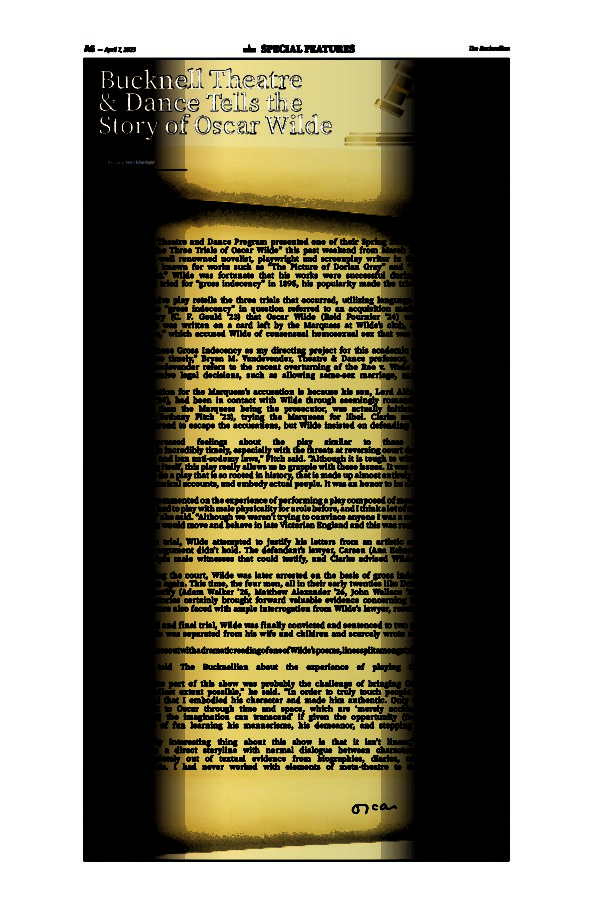Bucknell Theatre and Dance Department shares the story of Oscar Wilde
April 7, 2023
Bucknell’s Theatre and Dance Program presented one of their Spring 2023 productions, “Gross Indecency: The Three Trials of Oscar Wilde” this past weekend from March 31 to April 3. Oscar Wilde was a well renowned novelist, playwright and screenplay writer in the later half of the 19th century, known for works such as “The Picture of Dorian Gray” and “The Importance of Being Earnest.” Wilde was fortunate that his works were successful during his lifetime, but when he was tried for “gross indecency” in 1895, his popularity made the trial very high profile.
The extensive play retells the three trials that occurred, utilizing language and writings from the time. The “gross indecency” in question referred to an acquisition made by the Marquess of Queensbury (C. F. Gould ’23) that Oscar Wilde (Reid Fournier ’24) was a “posing somdomite.” This was written on a card left by the Marquess at Wilde’s club, comically misspelling “sodomite,” which accused Wilde of consensual homosexual sex that was illegal at the time.
“When I chose Gross Indecency as my directing project for this academic year, I had no idea it would be so timely,” Bryan M. Vandevender, Theatre & Dance professor, wrote in his director’s note. Vandevender refers to the recent overturning of the Roe v. Wade decision, and how other progressive legal decisions, such as allowing same-sex marriage, may also be at risk.
The motivation for the Marquess’s accusation is because his son, Lord Alfred Douglas (Kieran Calderwood ’24), had been in contact with Wilde through seemingly romantic letters. The first trial, rather than the Marquess being the prosecutor, was actually initiated by Wilde’s lawyer, Clarke (Bethany Fitch ’23), trying the Marquess for libel. Clarke suggested that Wilde instead go abroad to escape the accusations, but Wilde insisted on defending his honor in court.
Fitch expressed feelings about the play similar to those of Vandevender.
“This play is incredibly timely, especially with the threats at reversing court decisions that uphold gay marriage and ban anti-sodomy laws,” Fitch said. “Although it is tough to witness a threat of history repeating itself, this play really allows us to grapple with these issues. It was also generally really interesting to do a play that is so rooted in history, that is made up almost entirely of court transcripts and other historical accounts, and embody actual people. It was an honor to be able to tell this story.”
Fitch also commented on the experience of performing a play composed of mostly male characters.
“I’ve never had to play with male physicality for a role before, and I think a lot of my cast members can relate to this,” she said. “Although we weren’t trying to convince anyone I was a man, I had to embody the way a man would move and behave in late Victorian England and this was really fun to play with.”
During the trial, Wilde attempted to justify his letters from an artistic and poetic perspective, but the argument didn’t hold. The defendant’s lawyer, Carson (Ana Eckert ’26), asserted that he had multiple male witnesses that could testify, and Clarke advised Wilde to drop the case.
After leaving the court, Wilde was later arrested on the basis of gross indecency and sodomy and tried once again. This time, the four men, all in their early twenties like Douglas, were brought forward to testify (Adam Walker ’26, Matthew Alexander ’26, John Wallace ’25, Gabe Gross ’23). While their stories certainly brought forward valuable evidence concerning their relations with Wilde, they were also faced with ample interrogation from Wilde’s lawyer, resulting in a hung jury.
In the third and final trial, Wilde was finally convicted and sentenced to two years in prison with hard labor. He was separated from his wife and children and scarcely wrote after imprisonment.
The play closes out with a dramatic reading of one of Wilde’s poems, lines split amongst all the actors in the play.
Fournier told The Bucknellian about the experience of playing this weighty role.
“My favorite part of this show was probably the challenge of bringing Oscar Wilde back to life to the fullest extent possible,” he said. “In order to truly touch people with his message, it was crucial that I embodied his character and made him authentic. Only then can the audience connect to Oscar through time and space, which are ‘merely accidental conditions of thought [that] the imagination can transcend’ if given the opportunity (from De Profundis). It was a lot of fun learning his mannerisms, his demeanor, and stepping inside his mind.”
“One really interesting thing about this show is that it isn’t linear,” Fournier added. “Rather than a direct storyline with normal dialogue between characters, it’s constructed almost completely out of textual evidence from biographies, diaries, case files and historical records. I had never worked with elements of meta-theatre to this extent before.”




















